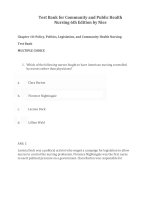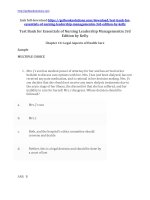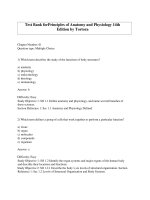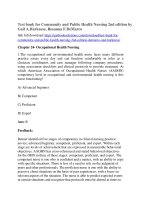Test bank for foundations of mental health care 3rd edition by morrison valfre
Bạn đang xem bản rút gọn của tài liệu. Xem và tải ngay bản đầy đủ của tài liệu tại đây (35.12 KB, 4 trang )
Full file at />
Chapter 1: The History of Mental Health Care
Elsevier items and derived items © 2005 by Mosby, Inc.
MULTIPLE CHOICE
1. Mental health is defined as
1. the ability to ignore the stresses of life.
2. a complete absence of emotional problems.
3. the ability to attain power and make money.
4. the ability to adjust to stress in an acceptable way.
ANS: 4
Definition of mental health
DIF: Cognitive Level: Knowledge
REF: Page 1
OBJ: 1
TOP: Introduction to Mental Health
MSC: Nursing Process Step: N/A
2. The client is depressed. Although in contact with reality, she is unable to dress and prepare
food for herself. The client is considered to be
1. acting out.
2. mentally ill.
3. extremely healthy.
4. going through a phase.
ANS: 2
Behavior interferes with the activities of daily living.
DIF: Cognitive Level: Synthesis
REF: Page 1
OBJ: 1
TOP: Definition of Mental Health
MSC: Nursing Process Step: Assessment
3. Mental health is influenced by inherited characteristics, childhood nurturing, and
1. financial status.
2. approval of others.
3. life circumstances.
4. the luck of the draw.
ANS: 3
All influence mental health/illness
DIF: Cognitive Level: Comprehension REF: Page 1
OBJ: 2
TOP: Definition of Mental Health
MSC: Nursing Process Step: N/A
4. In the earliest primitive societies, people believed that mental illness was the result of
1. an imbalance of humors.
2. demons and evil forces.
3. microbes and bacteria.
4. witches and magicians.
ANS: 2
History of mental illness
DIF: Cognitive Level: Knowledge
REF: Page 1
OBJ: 1
TOP: Primitive Societies
MSC: Nursing Process Step: N/A
5. To cure mental illness during the Dark Ages, priests would perform
1. exorcisms.
2. lobotomies.
buy this full document at
Full file at />
3. shock therapy.
4. religious services.
ANS: 1
Historical beliefs about mental illness
DIF: Cognitive Level: Knowledge
REF: Page 2
OBJ: 3
TOP: Middle Ages
MSC: Nursing Process Step: N/A
6. In the early 1900s ____ wrote a book that awakened the nation to the poor conditions of
care of the mentally ill.
1. Dorothea Dix
2. Clifford Beers
3. Philippe Pinel
4. Florence Nightingale
ANS: 2
Historical fact
DIF: Cognitive Level: Comprehension REF: Page 5
OBJ: 4
TOP: Twentieth Century
MSC: Nursing Process Step: N/A
7. The schoolteacher who began one of the most important crusades for humane care of the
mentally ill during the nineteenth century was
1. Dorothea Dix.
2. Clifford Beers.
3. Philippe Pinel.
4. Florence Nightingale.
ANS: 1
Historical fact
DIF: Cognitive Level: Knowledge
REF: Page 5
OBJ: 4
TOP: Nineteenth Century United States MSC: Nursing Process Step: N/A
8. The first person to explain human behavior in psychological terms was
1. Benjamin Rush.
2. Sigmund Freud.
3. Clifford Beers.
4. Phillipe Pinel.
ANS: 2
Historical fact
DIF: Cognitive Level: Comprehension REF: Page 5
OBJ: 4
TOP: Psychoanalysis
MSC: Nursing Process Step: N/A
9. Interest in mental health in the United States grew during the twentieth century as a result of
1. several wars.
2. the Depression.
3. congressional actions.
4. popular books and movies.
ANS: 1
Historical fact
DIF: Cognitive Level: Comprehension
TOP: Influences of War
REF: Page 5
OBJ: 5
MSC: Nursing Process Step: N/A
buy this full document at
Full file at />
10. The development of psychotherapeutic drugs allowed mentally ill people to
1. learn to behave properly.
2. live outside the institution.
3. not care about their problems.
4. live in a friendlier atmosphere.
ANS: 2
Historical fact
DIF: Cognitive Level: Comprehension REF: Page 6
OBJ: 6
TOP: Introduction of Psychotherapeutic Drugs
MSC: Nursing Process Step: N/A
11. The release of large numbers of mentally ill people into the community was known as
1. discharge.
2. commitment.
3. institutionalization.
4. deinstitutionalization.
ANS: 4
Definition of terms
DIF: Cognitive Level: Knowledge
REF: Page 6
OBJ: 7
TOP: From the Institution to the Community
MSC: Nursing Process Step: N/A
12. To meet the demand for community mental health services after the release of the mentally
ill into the community, the federal government proposed to establish a nationwide network
of
1. halfway houses.
2. state hospitals.
3. community mental health centers.
4. community mental health hospitals.
ANS: 3
Historical fact
DIF: Cognitive Level: Knowledge
REF: Page 6
OBJ: 8
TOP: Congressional Actions
MSC: Nursing Process Step: N/A
13. By 1980, Congress had passed one of the most progressive mental health bills in history,
which addressed community mental health care and clients’ rights and prioritized research
and training goals. This act was called the
1. Hill-Burton Act.
2. Medicare/Medicaid Bill.
3. Mental Health Systems Act.
4. Omnibus Budget Reconciliation Act.
ANS: 3
Historical fact
DIF: Cognitive Level: Comprehension REF: Page 7
OBJ: 9
TOP: Congressional Actions
MSC: Nursing Process Step: N/A
14. Passage of the Omnibus Budget Reconciliation Act in 1981 shifted the focus of mental
health care funding from the federal government to
1. care providers.
buy this full document at
Full file at />
2. state governments.
3. county governments.
4. insurance companies.
ANS: 2
Historical fact
DIF: Cognitive Level: Knowledge
TOP: Congressional Actions
REF: Page 7
OBJ: 9
MSC: Nursing Process Step: N/A
buy this full document at









